- 12 best SEO reporting tools to try in 2023
- Our criteria for choosing the best SEO reporting tools
- The 12 most effective SEO reporting tools in 2023
- 1. SE Ranking
- SE Ranking SEO reporting tool overview
- Pros
- Cons
- Pricing
- Extra features for agencies
- Verdict
- 2. SEO PowerSuite
- SEO PowerSuite reporting tool overview
- Pros
- Cons
- Pricing
- Verdict
- 3. AgencyAnalytics
- AgencyAnalytics SEO reporting tool overview
- Pros
- Cons
- Pricing
- Extra features for agencies
- Verdict
- 4. Semrush
- Semrush SEO reporting tool overview
- Pros
- Cons
- Pricing
- Extra features for agencies
- Verdict
- 5. Moz
- Moz SEO reporting tool overview
- Pros
- Cons
- Pricing
- Verdict
- 6. SpyFu
- Spyfu SEO reporting tool overview
- Pros
- Cons
- Pricing
- Verdict
- 7. Raven Tools
- Raven Tools SEO reporting tool overview
- Pros
- Cons
- Pricing
- Verdict
- 8. DashThis
- DashThis SEO reporting tool overview
- Pros
- Cons
- Pricing
- Verdict
- 9. Databox
- Databox SEO reporting tool overview
- Pros
- Cons
- Pricing
- Extra features for agencies
- Verdict
- 10. Reportz
- Reportz SEO reporting tool overview
- Pros
- Cons
- Pricing
- Verdict
- 11. Looker Studio
- Locker Studio SEO reporting tool overview
- Pros
- Cons
- Pricing
- Verdict
- 12. Google Analytics
- Google Analytics SEO reporting tool overview
- Pros
- Cons
- Pricing
- Extra features for agencies
- Verdict
- Conclusion
To truly understand how effective your SEO efforts are, you need detailed reports. This goes especially for SEO agencies who need to present clear results to their clients.
There are many SEO reporting tools out there, and choosing the right one can be daunting. That’s where we step in.
In this article, we’ve narrowed down the list to 12 top tools, each of which has earned our seal of approval. These include versatile SEO platforms with built-in reporting features and dedicated SEO reporting tools. We’ll discuss the advantages and drawbacks of each to help you make the most informed choice. Let’s dive in!
12 best SEO reporting tools to try in 2023
- SE Ranking – A top-notch SEO solution with built-in reporting for agencies and in-house teams.
- SEO PowerSuite – A complete toolkit for in-depth SEO analysis.
- AgencyAnalytics – Great for agencies looking for customizable dashboards.
- Semrush – A comprehensive SEO platform rife with functionalities.
- Moz – A popular SEO tool known for its domain authority metric.
- SpyFu – Well-known for uncovering competitor keyword strategies.
- Raven Tools – A cost-effective SEO tool with unique reporting features.
- DashThis – A reporting tool known for its impressive visuals.
- Databox – An SEO agency reporting software that integrates data from multiple marketing platforms.
- Reportz – Offers dynamic SEO reporting for clients with real-time, client-centric dashboards.
- Looker Studio – Ideal for integrating different data points into cohesive reports.
- Google Analytics – A must-have for foundational web traffic and user behavior insights.
Our criteria for choosing the best SEO reporting tools
To select the best SEO reporting tools for 2023, we considered several essential factors, including:
- User friendliness: How intuitive is the tool? Can seasoned experts and beginners alike navigate its features without difficulty?
- White Label functionality: Does the tool allow agencies to brand their reports? Is this feature included in the basic pricing plan or at an additional cost?
- Automation: How well does the tool streamline the reporting process? What tasks can it automate?
- Integration with other services: Which other tools does it support, and is it easy to integrate them?
- Pre-built report templates: Does the tool provide any ready-made templates? If so, how many and which ones are available?
- Custom report templates: Can users modify templates to create personalized SEO reports for their clients?
- Additional services: What other functionalities and services does the tool offer besides reporting? Are they included in the standard package, or do they cost extra?
- Flexibility of pricing policy: Does the tool offer different pricing plans to suit different needs? Are custom billing models available? Is pricing information transparent, and is there a clear cancellation policy?
The 12 most effective SEO reporting tools in 2023
1. SE Ranking
SE Ranking SEO reporting tool overview
SE Ranking is a versatile SEO platform designed for seasoned SEOs in both in-house teams and marketing agencies. It offers a comprehensive SEO Report Generator as one of its many tools. With an intuitive dashboard and insightful tips, it’s a top SEO reporting software for automating your report creation process. Its real strength, though, is in serving SEO agencies by streamlining their client reporting process with customizable templates, efficient client communication, and various SEO data export options.
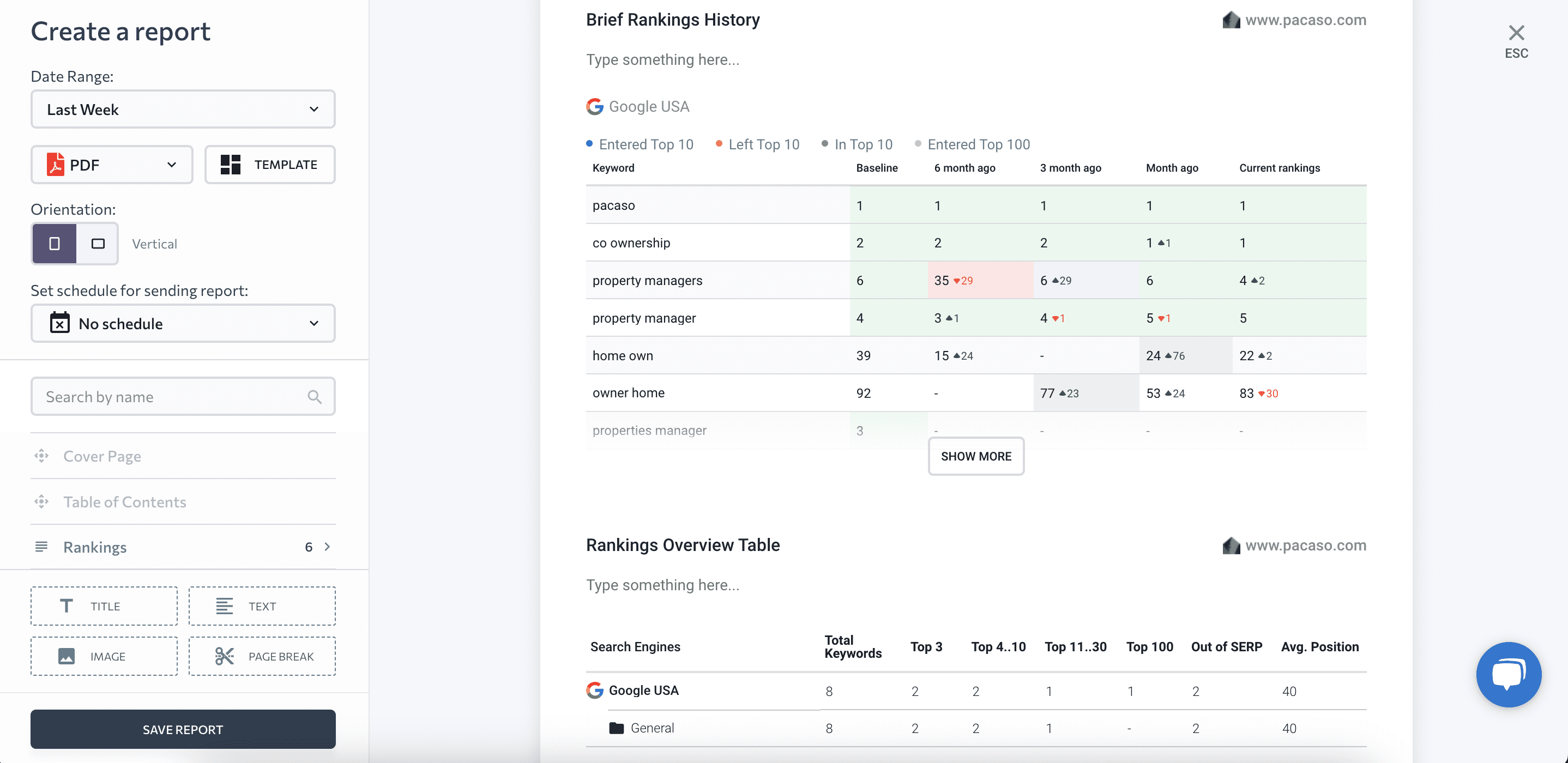
Here are the SEO metrics you can report on with this tool:
- Ranking progress: Use a variety of tables and graphs to showcase your agency’s progress in claiming top spots on the SERP for your target keywords.
- GSC and GA data: Add website traffic, conversions and other performance metrics to the report by syncing Google services with SE Ranking.
- Backlink analysis: Get insights into a website’s backlinks, including backlink count, newly acquired or lost links, and the dofollow/nofollow ratio.
- Website overview: Access important metrics for any site through the Competitor Research tool, including traffic estimates, domain trust, and the keywords it ranks for.
- Keyword metrics: Highlight keywords worth targeting for your client by looking at parameters like search volume and difficulty.
- Local marketing insights: Get comprehensive data on local SEO performance, including Google Business Profile statistics, local citations, review analytics, etc.
Pros
Great customization options: Its simple drag-and-drop builder lets users customize the appearance of their reports and choose which data points to include. Reports can be downloaded in PDF, CSV, XLS, or HTML format. Plus, you can define and compare different ranking periods. When it comes to report generation, one customer noted, “The platform’s professional reporting capabilities allow me to create customized reports with my branding, impress clients, and demonstrate the impact of my efforts through clear and data-driven results.”
White Label SEO reporting tools: Craft infinite SEO report templates that align with your brand identity, enhancing professionalism and client perception. In addition, set up scheduled reports sent from your corporate email address.
Seamless integrations with other tools: This includes platforms like Zapier, Bitrix24, SeoTools for Excel, Reportz.io, Looker Studio, and Google Analytics & Search Console. It not only enhances SEO data but also strengthens task automation, ensuring you’re always a step ahead.
Ready-to-use report templates: SE Ranking’s SEO report templates cover important areas like Traffic Overview, Rankings and competitors, and Website Audit issues. The best part? These must-have templates are accessible across all pricing tiers, ensuring optimized reporting no matter your plan.
Ease of use: SE Ranking stands out as one of the most modern and user-friendly SEO reporting software options on the market. Users have rated its Ease of Use at 9.3/10, surpassing the SEO Tools Average of 8.9.
Comprehensive tool suite: SE Ranking offers more than just reporting; it’s a robust SEO platform with a range of tools, including Site Audit, Keyword Research, Position Tracker, Backlink Checker, and Local Marketing. The Competitor Analysis feature is particularly insightful, revealing competitors’ organic and paid promotional approaches and uncovering potentially useful strategies. Additionally, the platform features AI-driven tools like the On-Page SEO Checker, SERP Analyzer, AI Writer, and Content Editor, among others.
Cons
Limited flexibility within its automated reports: Although SE Ranking is great for customizing manually generated reports, the automated versions have less breadth than other options on the market. Some users say these automated reports aren’t as intuitive or as customizable as their manual counterparts.
Collaboration limitations: While users can craft detailed reports, the platform does not fully support collaborative editing and sharing of these templates among team members. As highlighted by a user review: “Big fan of the reports but working together on them as a team is still a bit tedious. Templates can’t be shared and changed by different team members.” It’s worth noting though that the team is already working on adding this feature.
Pricing
SE Ranking has three different subscription options:
- The Essential package: This is best for freelancers and anyone who is just getting started. It’s priced at $55 monthly and lets you deliver 5 scheduled reports per month.
- The Pro package: Aimed at small agencies and teams, this option costs $109 a month and allows you to send 20 scheduled reports monthly.
- The Business option: Made for mid-sized agencies and ، businesses, this option is priced at $239 per month and lets you send up to 50 monthly reports.
Each of these plans includes unlimited manual reports, ready-to-use report templates, and guest links. White-label reports and other features for agencies are available in the Pro and Business plans, and the Agency Pack add-on costs $50 per month.
You can also save 20% if you choose the annual billing option, which covers the whole SEO toolkit. You’ll get way more than just the Report Builder feature, which is only one of many available tools. The platform’s 14-day free trial also allows users to test the tool before committing.
Extra features for agencies
- Collaborative access to the platform: SE Ranking simplifies data-sharing by enabling users to send guest links and grant clients access to essential tools. This facilitates the sharing of real-time SEO results, SERP breakdowns, on-page audits, and more. Additionally, data from keyword ranking reports can be shared through platforms like Looker Studio dashboards.
- Agency-centric capabilities: SE Ranking offers more than just SEO agency reporting tools. Its specialized Agency Pack provides various features specifically designed to enhance client engagement. For example, you can personalize the domain name according to your agency or add your company’s brand colors and logos for a personalized look. The Lead Generator tool ensures you acquire qualified leads by integrating the On-Page Checker widget on your website. You can also attract new clients by getting featured in SE Ranking’s curated Agency Catalog. Finally, the platform offers additional seats for your clients, allowing them access to specific SE Ranking features. It’s worth noting that the Agency Pack is an add-on that needs to be purchased separately.
Verdict
SE Ranking is one of the top SEO platforms available on the market. It comes with exceptional SEO reporting tools and suits a wide range of users. The platform’s pricing plans are diverse, and its dashboard is straightforward and user-friendly. This makes report generation easy and facilitates a range of other SEO tasks. Even with the basic package, you get comprehensive reporting options and tools that streamline your SEO efforts, giving you good value for your money.
For SEO agencies, there’s a special package that offers more than just white-labelув SEO reporting tools. It has an array of features to make client interactions smoother. By using this tool, you can assure your clients consistently receive well-presented reports on time.
However, it’s worth noting that since SE Ranking offers a variety of features, it’s not focused solely on reports. While versatile, SE Ranking may not be as specialized as platforms that are dedicated exclusively to reporting.
2. SEO PowerSuite
SEO PowerSuite reporting tool overview
SEO PowerSuite is a collection of four essential desktop-based SEO tools, each designed for specific SEO tasks. It also has a built-in reporting feature.
This suite includes:
- Rank Tracker: Focuses on tracking keyword rankings and organic traffic insights.
- WebSite Auditor: Offers a comprehensive SEO audit of websites.
- SEO SpyGlass: Dives deep into backlink analysis, providing reports with varying levels of detail.
- LinkAssistant: Concentrates on link-building efforts and offers insights into your campaign’s success.
SEO PowerSuite was crafted to cater to a wide range of demands. It acknowledges the unique optimization requirements of different websites and search engines, underscoring the platform’s commitment to customization.
With SEO PowerSuite, users can craft reports suited to their specific needs and cover crucial SEO metrics. The platform’s adaptive features ensure report creation accuracy for search engines like Google, Bing, or other major search engines. This positions SEO PowerSuite as one of the best SEO reporting tools.
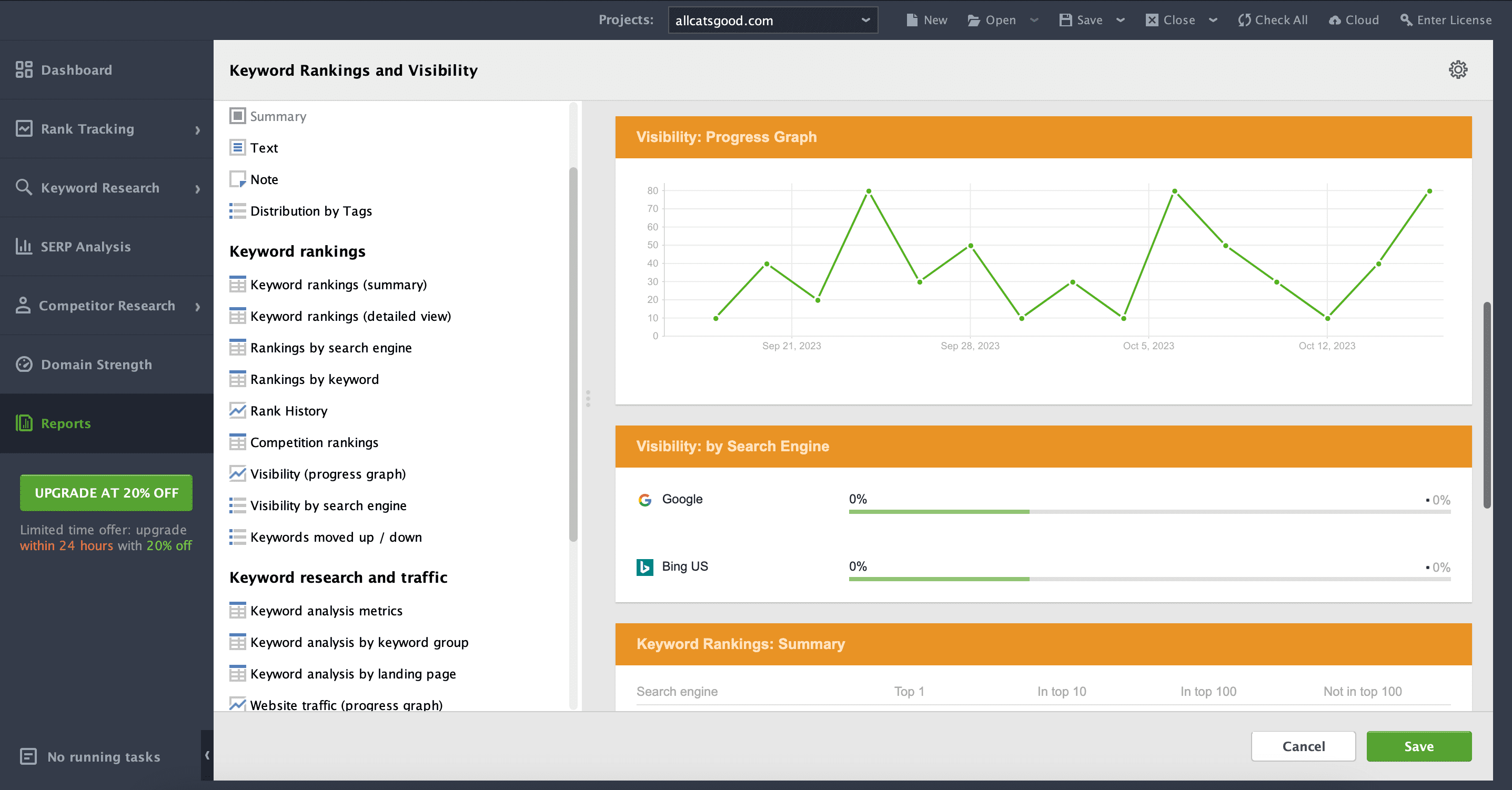
Pros
Diverse keyword reporting: The tool supports both PPC and organic search keyword tracking. Users can view how specific keywords perform across search engines and then monitor ranking changes.
Varied reporting formats: Users can choose between different reporting formats, such as HTML and PDF. They can decide on the delivery method, whether by email, website upload, or by saving files directly to their device.
Customizable templates: Depending on the optimization focus (e.g., Google, Bing, YouTube), users can pick from various templates and modify them to fit specific reporting needs.
Automated reporting: The platform can generate reports automatically based on user-defined schedules, reducing manual effort.
White-label reporting capabilities: The tool allows users to fully customize reports to match personal or client branding. This elevates the professionalism of the reports and ensures that clients receive data representations that resonate with their brand identity.
Comprehensive SEO solution: Users get more than just an SEO reporting software with their purchase, gaining access to four comprehensive SEO tools. However, for those seeking specific functionality, individual tools can be purchased separately.
Cons
Functionality constraints: Despite having a suite of four distinct SEO tools, its functionality isn’t as wide reaching and complex as some of its competitors. This limitation extends to both its reporting capabilities and other SEO functionalities.
Low value for money: While SEO PowerSuite’s pricing might appear competitive compared to other SEO tools on the market, it may not offer the best value for money. The number of features provided may underwhelm some users.
Restricted reporting access: The complete versions of each reporting tool are reserved exclusively for the Enterprise package, priced at $499/year. This makes it a more costly choice for anyone seeking robust reporting features.
Limited payment flexibility: There’s no monthly payment option. Users are obligated to pay upfront for the entire year, which may not be inconvenient.
Hard to use: Its user-friendliness lags slightly behind industry standards. With an Ease of Use rating of 8.6/10 on G2, it’s below the average rating of 8.9 for other SEO tools.
Unclear subscription renewal policy: Users have expressed concerns about SEO PowerSuite’s auto-renewal process. One user recounted an unexpected auto-renewal charge, even after enabling the “Notify me by email when a subscription is about to expire” option.
Pricing
SEO PowerSuite offers a variety of pricing plans, each tailored to different needs. But consider that reporting features like printing reports on paper, saving reports as PDFs, scheduling and delivering reports, and exporting data in specific formats, are available only in the ENTERPRISE Plan.
- Free Plan: This is the basic version and is available indefinitely. It lacks some necessary features like scheduled reports, data exporting, and project saving.
- LITE Plan: Priced at $99/year, this plan is ideal for small SEO projects.
- PROFESSIONAL Plan: At $299/year, users get unlimited data for in-house use.
- ENTERPRISE Plan: At $499/year, designed for SEO professionals and agencies needing features like SEO reporting software for clients.
Each plan comes with a yearly subscription model and without a monthly payment option. While the prices cover all four tools within the suite, users have the option to purchase a specific tool of their choosing at a reduced price.
Verdict
SEO PowerSuite offers four powerful SEO tools, but it has notable constraints in functionality and ease of use compared to its competitors. Its advanced reporting features are exclusive to the higher-priced Enterprise version, and the yearly payment mandate may deter some potential users. The unclear renewal policy further complicates its positioning. While SEO PowerSuite has robust offerings, potential users should weigh its pros and cons to assess its overall value.
3. AgencyAnalytics
AgencyAnalytics SEO reporting tool overview
Another one of the best SEO reporting tools is AgencyAnalytics. This robust platform is made for marketing agencies to streamline and automate client reporting. It’s a comprehensive solution for marketing and SEO agencies to gather all their clients’ data and show the total value of their services. By seamlessly integrating a vast array of marketing tools and platforms, AgencyAnalytics makes reporting easier.
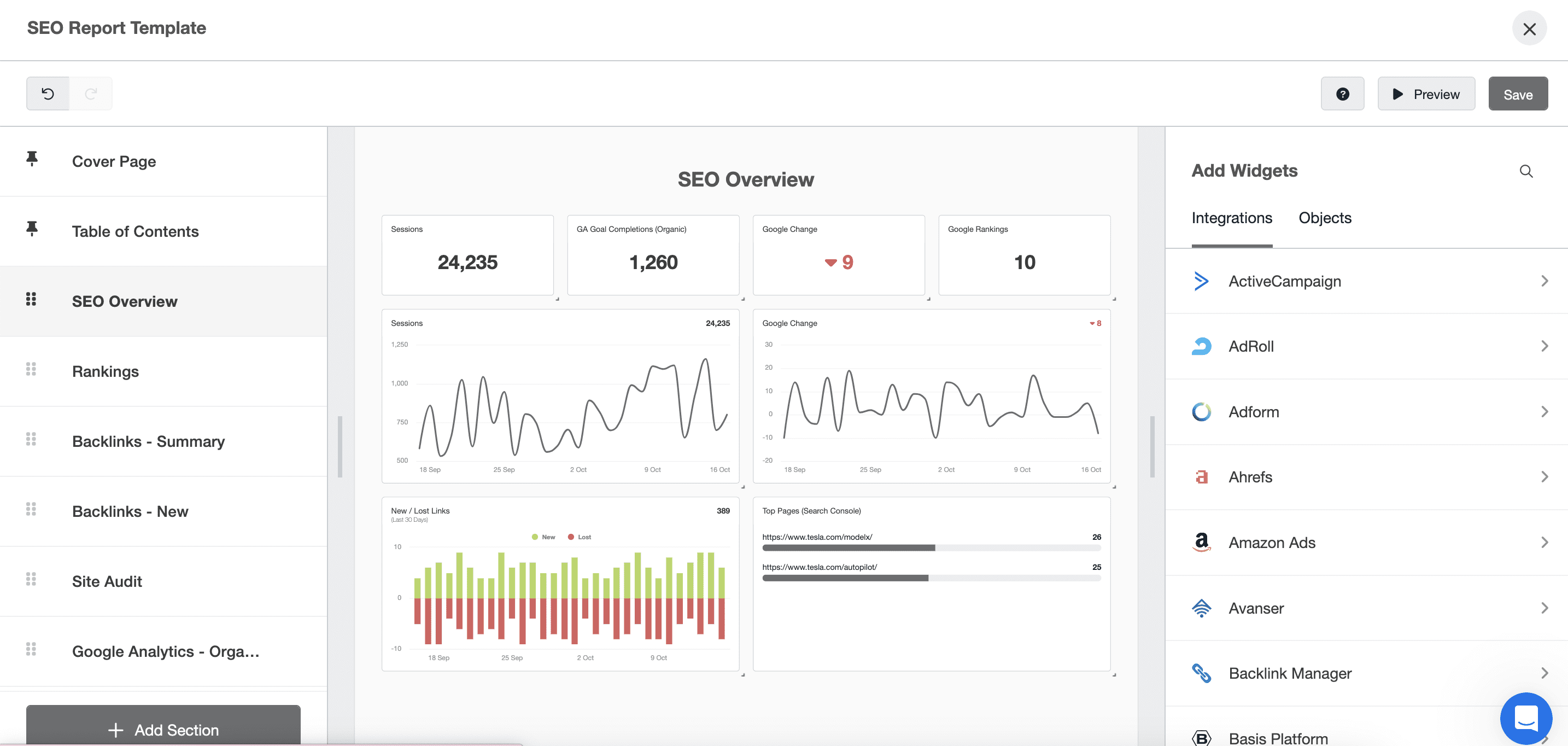
Pros
Automated reporting: Forget about spreadsheets and manual data entry. This platform offers fully automated reports and custom dashboards, ensuring efficiency, accuracy, and scalability for marketing agencies.
White-label branding: Strengthening agency branding with the 100% white-label reporting feature is easy. Agencies have access to powerful SEO reporting software for clients. This tool lets them upload their logo, select a color scheme, and even host on their own domain for a truly personalized platform.
Impressive integration capabilities: With over 75 marketing integrations, including major tools like Google Analytics, Facebook Ads, Shopify, and Mailchimp, agencies can easily centralize all their clients’ data. This vast number of integrations ensures that agencies can remain adaptable when extending or adjusting their toolset.
Customizable dashboards & reports: Personalization is at the heart of AgencyAnalytics. The platform offers a suite of customizable widgets and a drag-and-drop report builder, enabling agencies to tailor reports to each client’s unique needs.
Additional SEO tools: Beyond reporting, the platform provides tools for rank tracking, backlink monitoring, site auditing, and keyword research. These features help agencies monitor their SEO progress, pinpoint potential site issues, and identify new keyword opportunities.
Exceptional ease of use: With a score of 9.5/10 on G2, AgencyAnalytics significantly surpasses the average score of similar tools, which is 8.9. One customer even said, “After signing up, it literally took me about 15 minutes to get all of the basics of client reporting set up and configured.”
Multilingual platform: AgencyAnalytics supports a broad range of languages, including Czech, Danish, German, Greek, Chinese, and many more, accommodating global users and diverse clientele.
Cons
Limited accuracy: Some users find that some integrations, particularly Mailchimp, do not offer in-depth customization for specific date-related data. There have also been cases where particular fields presented inaccurate data, requiring double-checking for precision.
Limited number of features: Compared to comprehensive all-in-one SEO platforms like SE Ranking, AgencyAnalytics may not be as feature-rich or as capable of helping you automate every SEO process. It also lacks some of the more advanced features offered by tools designed solely for reporting. One customer mentioned, “There are a few features that the product is lacking. And a couple of times, it has required some workarounds to display data in the desired manner. However, they are continuously updating, and I believe most of the issues I’ve encountered will be addressed in time.”
Variable pricing structure: Instead of fixed pricing packages, AgencyAnalytics charges per customer campaign. This pricing model can be costly for agencies handling many campaigns.
Pricing
AgencyAnalytics has a unique pricing structure. It charges based on individual client campaigns and not the typical fixed package rate.
- Freelancer: At $12 per month for each client campaign, users must purchase at least 5 client campaigns. Expect to pay at least $60 per month with this plan.
- Agency: This plan is $18 per month per client campaign, and you are required to buy at least 10 client campaigns. This option will cost you a minimum of $180 per month in total.
- Enterprise: Pricing for this plan can be customized based on each user’s needs, with a minimum threshold set at 50 or more client campaigns.
The tool’s standard features are available across all plans, including Scheduled Reports, integrations with various tools, and the ability to grant clients access to campaigns. The White Label SEO reporting software is only available after purchasing the Agency and Custom packages.
Extra features for agencies
- Client management features: AgencyAnalytics isn’t just an SEO reporting tool for agencies. It also has a CRM tool for managing client contact details, as well as a project management tool to oversee tasks and deadlines. It acts as an all-in-one solution for agencies and smoothens the process of managing multiple clients.
Verdict
AgencyAnalytics is one of the best tools for SEO reporting. It helps marketing agencies keep clients in the loop. With tons of integrations, customization options, and a user-friendly platform, it scores pretty high on our list. But the platform has some pitfalls regarding data accuracy with specific integrations. Its feature set is also limited compared to SEO tools like SE Ranking and reporting tools like Databox.
Before investing in this tool, make sure to carefully gauge the total cost of serving all your clients with its specific pricing model. While AgencyAnalytics offers compelling advantages, it’s important to evaluate if it suits your agency’s unique needs.
4. Semrush
Semrush SEO reporting tool overview
Semrush is a comprehensive online marketing platform known for its vast array of tools for almost every aspect of SEO. Its robust functionalities make Semrush a favored tool among large SEO agencies and digital marketers worldwide.
When it comes to SEO reporting, Semrush empowers users to create customized reports that cover multiple marketing channels, including SEO, content marketing, competitor analysis, PPC advertising, social media marketing, and more.
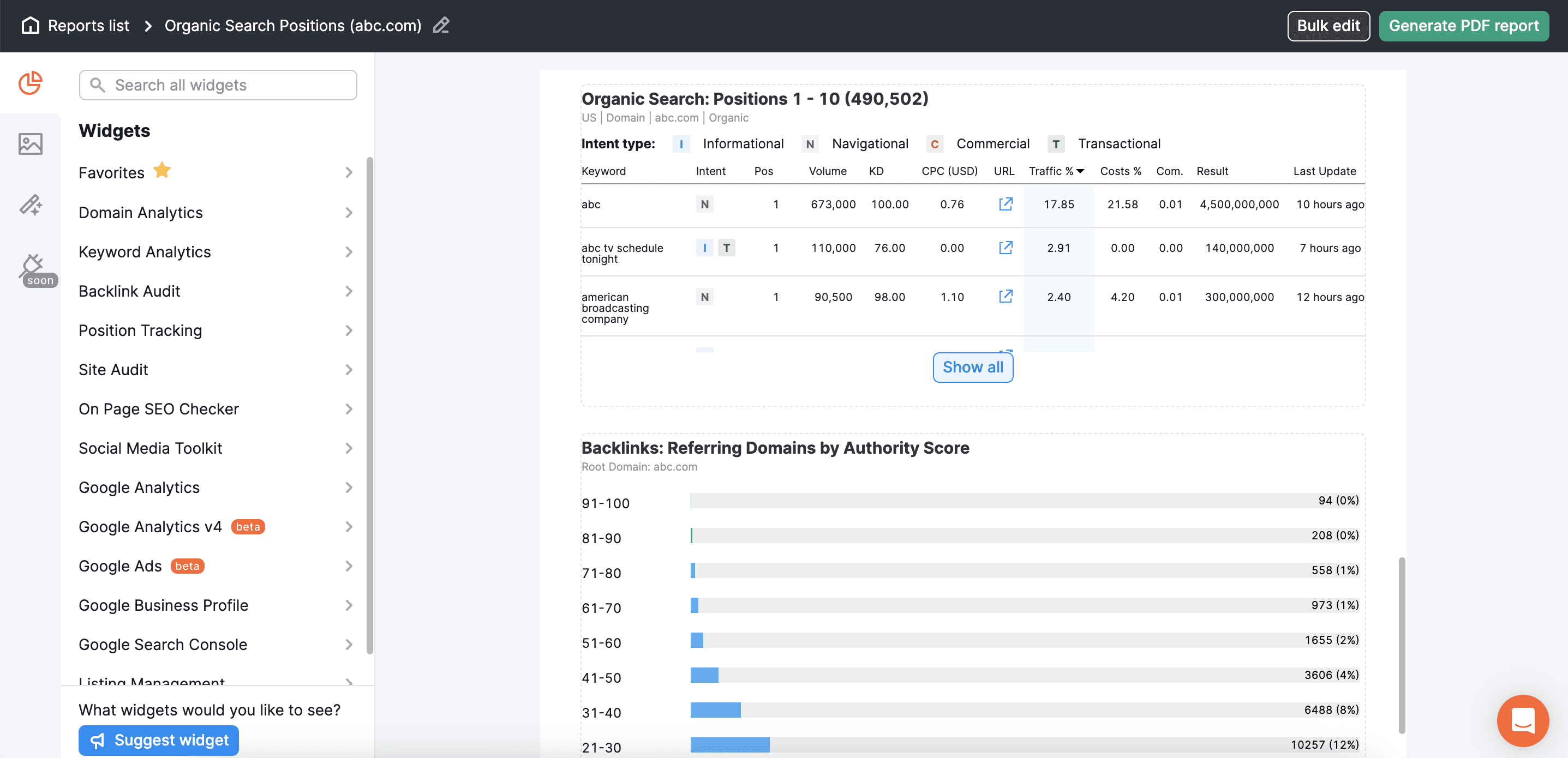
Pros
Automated SEO reports: Users can set up, schedule, and send automated SEO reports with details on search engine ranking trends, competitor metrics, organic traffic, backlinks, and more.
Variety of pre-made templates: This includes an SEO Report, Organic Search Report, Technical SEO Report, and Competitor Research Report, among others.
White-labeling features: With the Agency Growth Kit subscription, agencies can fully personalize their reports by integrating their brand’s logos, colors, and other elements.
Multiple integrations: Semrush integrates seamlessly with platforms like Google Analytics, Google Search Console, Google Business Profile, Google Ads, and more, delivering an extensive and integrated user experience.
User-friendly report generation: Semrush offers drag-and-drop templates to help users customize and present relevant data.
Comprehensive offering: Semrush is one of the most extensive tools available. It has a wealth of rich features, in one package.
Cons
Limited report format: Semrush only offers reports in PDF format, restricting data editing flexibility.
Steep pricing: Semrush’s most basic package costs $129.95/month, which could be a deterrent for smaller businesses.
Additional costs for agencies: While Semrush offers an Agency Growth Kit with more specialized features, these options come at an additional expense, potentially increasing costs for agencies who want to utilize the platform fully.
High learning curve: On the G2 platform, Semrush’s Ease of Use rating stands at 8.4, below the average rating for SEO tools, which is 8.9.
Pricing
Semrush divides its pricing into three primary tiers to meet the varied needs of its user base:
- Pro: Priced at $129.95 per month, this plan is geared towards SEO newcomers and smaller teams with a restricted budget. It provides five scheduled PDF reports, includes PDF template sharing, and offers provisions to share with both “edit” and “read-only” access.
- Guru: Costing $249.95 monthly, this tier is tailored for small to medium-sized businesses (SMBs), as well as emerging marketing agencies. Beyond the Pro offerings, the Guru plan allows for 20 scheduled PDF reports and offers a Looker Studio Integration.
- Business: With a monthly charge of $499.95, this plan is for well-established agencies. It’s great for e-commerce projects and businesses with a substantial web presence. It includes all the Guru features and permits users to generate up to 50 scheduled PDF reports.
Regardless of the chosen plan, users can secure a 17% discount if they opt for annual billing. It’s important to note that there might be additional expenses with Semrush, especially for extra functionalities. This could include adding more users or buying the additional Agency Growth Kit. These added expenses can range between $69 and $149 monthly.
Extra features for agencies
- Agency directory: With the Agency Growth Kit, you can get listed in Semrush’s agency directory. This expands your agency’s visibility and gives you more qualified leads.
- Integration with the Semrush CRM: Semrush provides a CRM tool that allows users to organize and store reports by customer profile. This greatly enhances the multi-client management process.
- Client portal: This feature allows agencies to create a special environment for clients where they can monitor project progress, task implementation, and achieved results.
Verdict
Semrush is a prominent tool in the world of digital marketing. It has won the trust of countless SEO agencies and professionals around the globe. Its extensive toolset sets it apart, covering everything from SEO and content marketing to PPC and social media analysis.
Semrush is arguably one of the best tools for SEO reporting. It offers its users numerous pre-made templates and Integrates with tools like Google Analytics, Google Ads, and others to ensure a cohesive digital marketing journey. Its intuitive drag-and-drop feature and stellar data visualization mechanics make report generation and presentation a breeze.
But every rose has its thorns. Semrush’s PDF-exclusive report format and its somewhat high entry-level price may make smaller businesses or individual users think twice.
While this platform is a boon to many, its rich feature set comes with a slightly steeper learning curve.
From an agency perspective, the automation, white-labeling, and CRM integration add obvious value. But it’s also important to consider the potential additional costs, especially when including specialized features from the Agency Growth Kit.
5. Moz
Moz SEO reporting tool overview
Moz is a well-known SEO software suite recognized by small businesses, agencies, and large enterprises.
It offers three main options:
- Moz Local: Designed specifically for businesses with physical locations or defined service areas.
- Moz Pro: The preferred choice for businesses aiming to attract quality website traffic and get measurable results.
- STAT: An ideal solution for businesses tracking website keywords on a large-scale.
Moz Pro is the most popular choice, offering features like keyword analysis, position tracking across various search engines, and site crawling and auditing. It also provides one of the best SEO reporting software on the market.
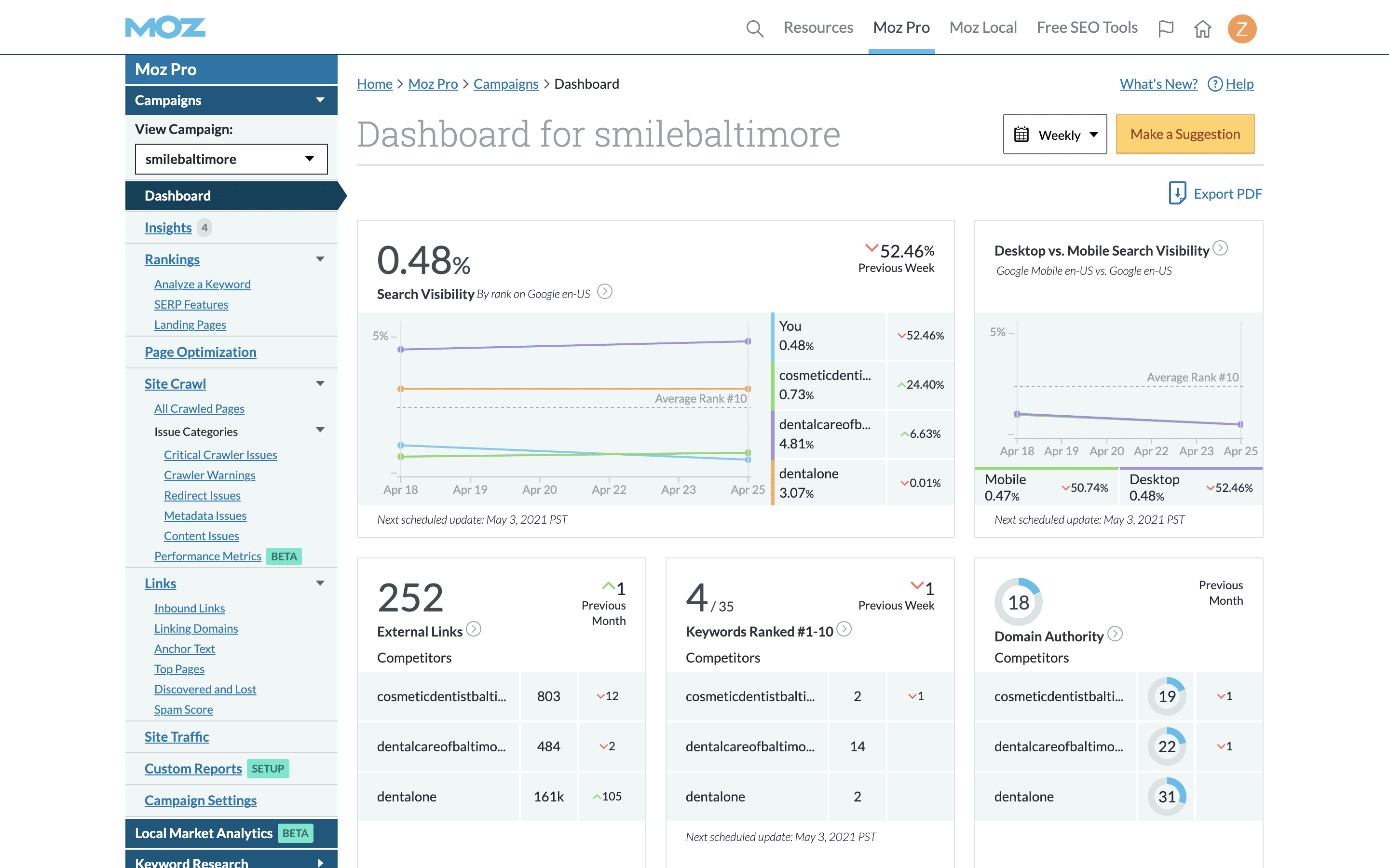
Pros
Customized reporting: Beyond generating and exporting reports in preferred formats like PDF or CSV, users can effortlessly modify these documents by integrating charts and graphs directly from Moz Pro and then add their unique insights and comments.
Engaging visuals: Moz Pro uses visuals to help users understand their successes, shortcomings, and potential opportunities.
White-labeling feature: Moz Pro allows users to replace the Moz emblem with their own brand logo in reports. This is perfect for both internal purposes and external client presentations.
Ready-made templates: Moz Pro features various report templates for quick sharing, whether the report is of an in-depth competitive analysis or a complex site audit.
Automated report scheduling: The platform offers an automatic report scheduling feature to help reduce users’ time on manual report dispatching. Moz Pro also allows users to seamlessly share data with teams and managers.
Cons
Value for money: Moz can be more expensive than competitors like SE Ranking and Semrush while offering a narrower feature set.
Integration issues: A common gripe about Moz is the insufficient integration between tools. This can hinder workflows, especially in client reporting.
Usability concerns: With a user rating of 8.7/10 for ease of use, Moz Pro lags behind. User feedback suggests difficulties in setting up and customizing reports.
Limited SEO reporting on basic plan: Features like report templates are not available on the cheapest plan, which may not suit budget-conscious users or smaller businesses.
Pricing
Moz Pro’s pricing model offers a tiered approach to suit varying budgets and needs:
- Standard: Priced at $99 per month, this is the entry-level offering. Certain SEO reporting features, such as white-labeling and specific report templates, aren’t included at this price point.
- Medium: Priced at $179 per month, it provides more comprehensive features for more advanced SEO tasks.
- Large: Designed for businesses with more extensive requirements, costing $299 monthly.
- Premium: The top-tier Premium plan costs $599 monthly, offering the broadest set of tools available on Moz.
A notable feature is that all pricing plans include unlimited scheduled PDF reports.
Moz Pro also offers an annual payment option that grants users a 20% discount compared to the cumulative monthly charges.
Verdict
Everyone knows that Moz is a major player in the SEO industry. It’s praised by a broad range of companies. But when comparing its cost-to-feature ratio to competitors like SE Ranking and Semrush, its overall value for reporting is far less obvious.
The platform’s issues with integration and feedback on usability indicate significant room for enhancement. From an agency perspective, Moz doesn’t necessarily outshine its rivals. Even though it offers standard features like white label SEO reporting tools and report scheduling, what it presents is nothing unique or game changing. Given its higher price point, potential users should carefully weigh their options before committing.
6. SpyFu
Spyfu SEO reporting tool overview
SpyFu is a helpful tool for competitive analysis in both SEO and PPC landscapes. It dives into competitor strategies for keywords, content, and backlinks. Its core goal is to empower users to refine their strategies by learning from their competitors, leading to better rankings, reduced costs, and more effective marketing.
One of its offerings is a powerful set of reporting tools. The reports cover competitor analysis, keyword research, rank tracking, and detailed SERP analysis. They can scan 7 billion results across 109 million domains to provide valuable insights for online marketers.
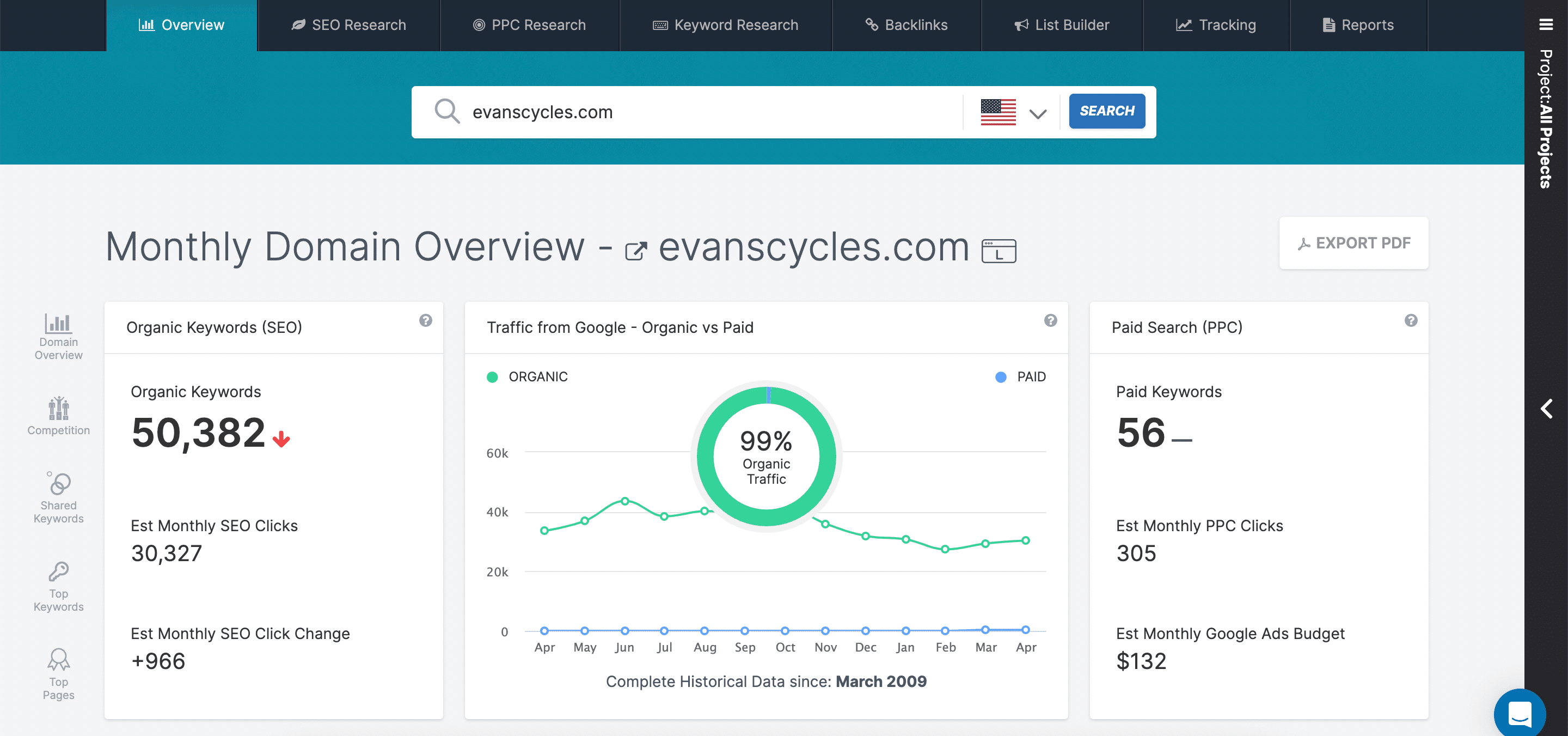
Pros
Ready-made templates: SpyFu offers a range of templates, allowing users to quickly select, populate, and present reports.
Easy-to-understand insights: The reports are intuitive for all users and offer actionable insights. These insights help users identify the biggest opportunities in a keyword group for content planning, showcase their monthly SEO progress, and more.
White-labeling feature: SpyFu lets users brand reports with logos and thematics to offer a polished in-house look. This helps users significantly improve perceived value.
Full customization: Beyond branding, SpyFu’s reports can be fully tailored to users’ exact needs, from the insights to their appearance.
SEO reports for every sales stage: SpyFu lets users generate reports for various phases of the sales cycle, from pre-sales to upselling. Each report is versatile, detailed, and focused on boosting business growth.
Effective content planning: SpyFu’s Recon Files report provides users with content guides to help them save time on developing their content strategy
Expert PPC insights: Custom reports provide invaluable recommendations for PPC ads based on your competitors’ actions.
Cons
Report formatting issues: Certain users say downloading reports can be cumbersome, and the formatting isn’t always clear.
Outdated report design: One user has remarked that the visual presentation of reports is dated, saying that it contains small fonts that are difficult to read and color schemes and charts reminiscent of designs from the 1990s.
Limited features: While effective for competitive analysis, SpyFu lacks a comprehensive suite of SEO tools. There are no features for website auditing, content creation, or local marketing.
Pricing
SpyFu offers a range of subscription plans:
- Basic: For $39/month, users get 10 small domain SEO reports and 10 Google Ads Advisor PPC reports. It’s ideal for beginners exploring SEO and PPC analysis.
- Professional: Priced at $79/month, this package provides 30 small-domain SEO reports, 10 medium-domain SEO reports, and 30 Google Ads Advisor PPC reports. It’s the cheapest option containing white label SEO reporting tools, and is ideal for more experienced users or small businesses needing comprehensive insights.
- Team: Designed for larger teams or agencies, this plan costs $299/month. It grants unlimited access to small domain SEO reports, 30 medium domain SEO reports, 10 large SEO reports, and unlimited Google Ads Advisor PPC reports. White labeling features and other SEO reporting tools for agencies are also included.
If you’re considering a longer commitment, SpyFu has an attractive annual subscription option that can get you the basic plan for as low as $16/month, making SpyFu a competitively priced tool in its niche.
Verdict
SpyFu is a powerful tool for businesses focusing on competitive analysis in SEO and PPC. Its unique reporting features, such as the Google Ads Advisor, provide unparalleled insights.
You can also create reports using pre-designed templates, customize, and white-label them. However, it’s worth noting that the report design can be cumbersome and formatting lags sometimes.
If your primary focus is monitoring competition, SpyFu is a compelling choice. But if you are looking for a broader range of SEO functionalities, other platforms like SE Ranking might be more fitting.
7. Raven Tools
Raven Tools SEO reporting tool overview
Raven Tools serves as a comprehensive digital marketing platform designed for work on a wide range of online campaigns, including SEO, PPC, and social media. One of its distinguishing features is its extensive integration capabilities. The platform seamlessly blends with over 30 tools, including Google Search Console, Google Analytics, Twitter, and various advertising channels. This broad spectrum of integrations amplifies its functionality, providing users with a unified view of their digital campaigns from multiple sources.
With Raven Tools, users can tailor reports to suit their specific needs and cover essential online marketing metrics. Its dynamic features ensure the accuracy of these reports, making Raven Tools one of the most essential SEO reporting tools for agencies and marketing specialists.
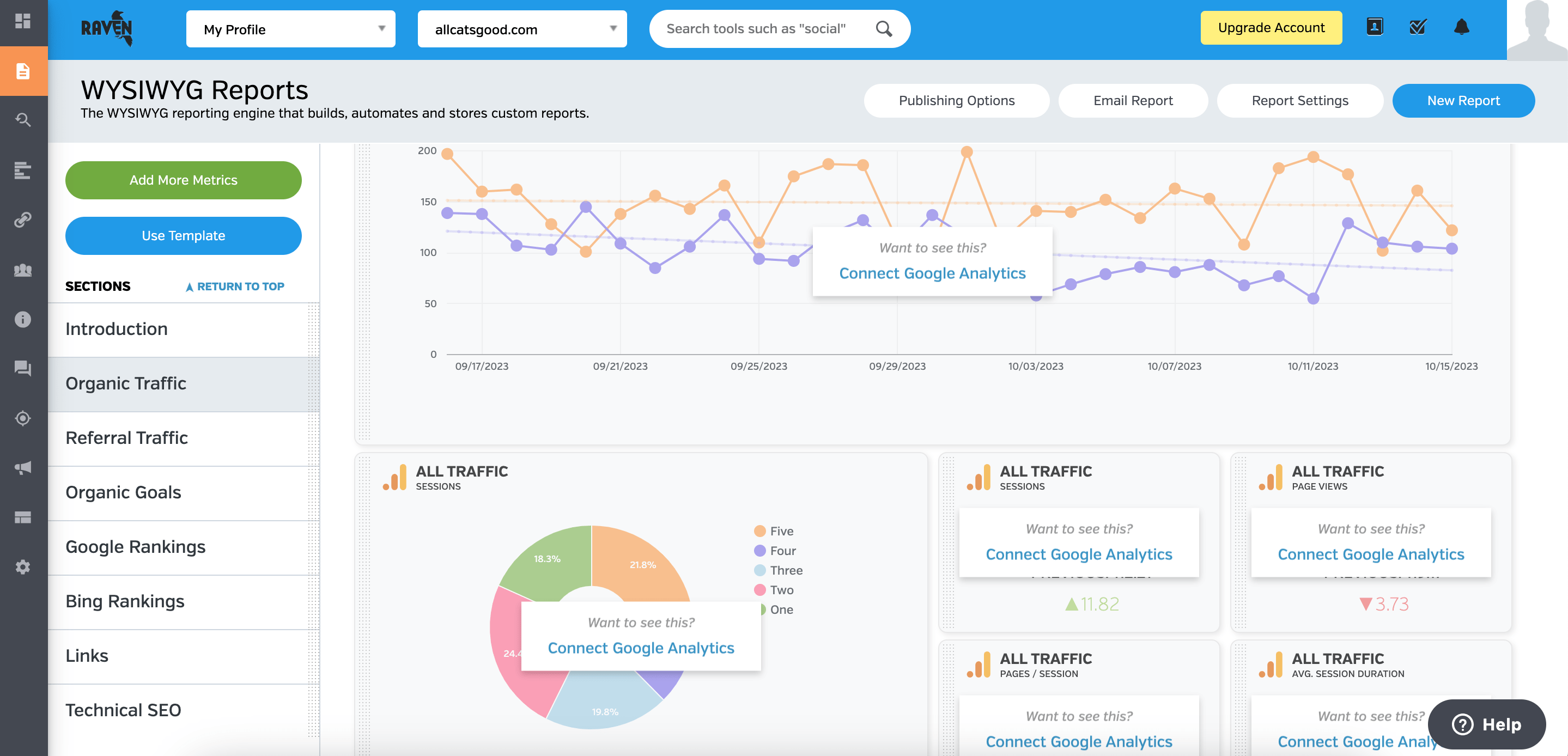
Pros
Drag-and-drop interface: The tool boasts an intuitive drag-and-drop editor, streamlining the report creation process for a user-friendly experience.
WYSIWYG reporting feature: The platform’s “What You See Is What You Get” feature guarantees clear data presentation, delivering exactly what’s configured in the reporting interface.
White-labeled Reports: Raven Tools lets users create branded reports, enhancing professionalism and brand identity.
Connect to multiple platforms: With data aggregation across 30+ platforms, it provides a comprehensive analytical overview without switching between different tools.
Data visualization tools: As one of the best SEO reporting software, Raven Tools excels in visually representing data, making it easy to grasp trends, comparisons, and results.
Consolidated dashboard: By integrating data from various sources, the tool offers a unified dashboard, eliminating the need to shuffle between different platforms.
Versatile reporting formats: Raven Tools offers users flexibility in sharing and presenting data, with options like shareable URL Reports (in HTML and PDF formats) and comprehensive PDF reports with cover pages, tables of contents, and footers. Raven Tools also provides real-time reporting through Live CSV and URL Data for those who need up-to-the-minute data.
Cons
Manual corrections required: Despite its automatic scheduling function, some users admitted having to manually correct the reports, which diminishes the benefit of automation.
Limited customization of charts: While the generated reports are of good quality, there are constraints in the presentation of the charts. This restricts users’ ability to tailor reports to their specific needs.
No inter-account report import: Raven Tools cannot import reports between different accounts for users or agencies with multiple accounts. Reports can only be transferred between profiles within the same account.
Complexity: Compared to other SEO tools, Raven Tools has a slightly lower user-friendliness score, with an 8.4 rating on G2. The average score for SEO tools is 8.9.
Pricing
Raven Tools offers a tiered pricing structure, with monthly rates ranging from $49 to $479. Purchasing an annual subscription unlocks potential savings by granting up to a 30% reduction from its monthly rates. The packages differ by number of manageable projects and user accounts. Also, with the two low-tier packages, its white-label feature is restricted:
- Both Small Biz, priced at $49/month, and Start, at $109/month, offer white labeling features that let users customize subdomains, emails, and reports.
- Grow, Thrive and Lead packages, which are priced at $199/month, $299/month and $479/month, allow subscribers to enjoy the full spectrum of its white-label capabilities.
Moreover, all packages include:
- Automated client reports
- Flexible report sourcing data from 25+ platforms for diverse KPI visualizations
- Customizable dashboard
- Shareable reports through both URL (HTML) and downloadable PDFs.
- Real-time report accessibility with live CSV and URL data
- Campaign events and tags
Raven Tools also provides a complimentary 7-day free trial to help customers explore its functionalities.
Verdict
Raven Tools is one of the best SEO reporting software on our list. It has tons of invaluable reporting features, especially for agencies. Beyond its robust reporting features, Raven Tools has tons of essential SEO utilities for users to take advantage of.
With its competitive pricing similar to other comprehensive SEO solutions, you should seriously consider Raven Tools. But one downside to consider is its slightly intricate interface—a small trade-off for its expansive capabilities.
8. DashThis
DashThis SEO reporting tool overview
Stepping away from all-in-one SEO platforms, let’s look at tools crafted explicitly for reporting. The first one is DashThis. Designed to cater to a wide user base, from marketing teams and agencies to freelancers and executives, DashThis pledges to streamline report generation.
DashThis shines in its configuration capabilities, enabling users to connect to major platforms such as Google Analytics, Facebook, LinkedIn, Google Ads, and more with just a few clicks.
DashThis offers specialized templates and customized reports, spanning social media, SEM, PPC, and SEO.
In the realm of SEO, DashThis provides dedicated automated SEO reporting software, including many beneficial features for agencies.
Pros
Comprehensive dashboard: DashThis offers an all-encompassing SEO reporting software, centralizing organic traffic analytics, keyword rankings, backlink reports, and more for easy access.
Automation: Rather than manually fetching data from various SEO tools like Google Analytics, Google Search Console, Moz, Ahrefs, and Semrush, users can link them to DashThis. The platform automates data retrieval and even handles report distribution to mailing lists according to your schedule.
Versatile KPI tracking: Users can monitor a variety of SEO metrics and KPIs, including search engine rankings, organic searches, page load speed, CTR, backlinks, page and domain authority, and many more. It also lets users track their marketing campaigns and offers insights for content marketing.
High-level customization and white-labeling: DashThis allows users to remove its branding, add custom logos, colors, and comments, replace default URLs, merge data, and use drag-and-drop widgets. With both preset and customizable widgets available, users have flexibility in how they can present data.
Pre-built SEO report templates: For those unsure about which KPIs to track, DashThis provides handy SEO report examples and ready-to-use templates, easing the process for beginners or those seeking a standardized reporting structure.
Exceptional visuals: DashThis’ reporting interface is widely acclaimed, with as many as 96% of users on G2 giving positive ratings to its graphs and charts. These visuals make data interpretation straightforward and visually appealing.
User-friendly interface: Rated 9/10 on G2 (surpassing the average of 8.9/10), DashThis’ interface is very intuitive. One satisfied user heralded it as the “Perfect agency software to manage client reports,” noting how even junior consultants have an easy time navigating it and can locate the information they need quickly.
Cons
Integration limitations: While DashThis supports integration with over 30 data sources, including major platforms like Ahrefs, Google Ads, and Instagram, it doesn’t cover every data source, limiting its functionality here compared to some of its competitors. To work around this, DashThis offers a CSV File tool for direct data uploads, but users must set up and manage this feature independently.
High pricing for small entities: Several users have highlighted DashThis’ pricing as a potential barrier, especially for smaller businesses or freelancers. One user noted, “The pricing can be a bit steep for small businesses or freelancers. If you only need a few dashboards, this may not be a big issue, but the cost can add up quickly if you need a lot of dashboards.”
Learning curve for advanced features: Despite its user-friendly interface, some users believe that DashThis has a steeper learning curve when it comes to its advanced features. One user shared, “It took me a while to figure out some of the more technical items, like how to enter Google Analytics API language into the queries.” However, the same user also acknowledged that once they got the hang of it, they were able to use the tool to its full potential.
Dashboard limitations for freelancers: Freelance marketers might feel restricted by the dashboard limits imposed by DashThis. As one user pointed out, “If you’re a freelance marketer, you’re going to have to upgrade to a larger account if you have several clients.”
Pricing
DashThis offers four distinct pricing packages. The primary difference between these packages is in the number of dashboards provided.
In DashThis, a ‘dashboard’ denotes a single marketing report. No matter which plan you choose, each dashboard can seamlessly integrate all your marketing platforms, sources, KPIs, and metrics.
This level of integration offers a holistic view of your marketing initiatives. Here’s a rundown of each plan’s pricing:
- Individual Plan: At $45/month, this plan offers three dashboards. The White label SEO reporting tool is somewhat restricted, allowing users to only add logos and modify colors.
- Professional Plan: Priced at $139/month, this package grants access to 10 dashboards and features full white labeling capabilities.
- Business Plan: For $269/month, users get 25 dashboards. In addition to the features of the previous plans, the business plan offers advanced customer service support.
- Standard Plan: Tailored for extensive reporting needs, this plan costs $419/month and offers a minimum of 50 dashboards. Users can acquire additional dashboards for an extra charge if needed.
Beyond the specified differences, all packages largely include the same set of features. For those considering long-term use, DashThis offers a discount on annual billing, making it a cost-effective choice.
Verdict
DashThis offers plenty of advantages, showcasing extensive functionality. Its solid reputation is further underscored by its impressive rating of 4.8/5 on G2. Its versatility, coupled with its user-friendly interface, firmly establishes it as one of the best SEO reporting software.
But if expansive integrations are your top priority, or if you’re new to reporting, it’s wise to weigh your options before committing to DashThis. And when budget constraints come into play, you’ll want to weigh the pros and cons more carefully. By investing slightly more than what you’d pay for three reports in DashThis, you can access tools like SE Ranking or Raven Tools. They offer a more expansive array of other SEO features.
While DashThis is undoubtedly among the top reporting tools, don’t dive in before ensuring its offerings align with your unique needs and financial considerations.
9. Databox
Databox SEO reporting tool overview
Databox is a powerful reporting platform for creating business analytics and KPI dashboards. It offers data connection through 100+ native integrations. Additionally, users can fetch data from SQL databases or via APIs.
The tool offers ready-made dashboard templates that span different domains, including marketing, sales, ecommerce, software development, and SaaS.
Among the tool’s diverse range of applications, it also has a feature for generating SEO reports. It centralizes all your data in one place, eliminating the need to switch between multiple platforms.
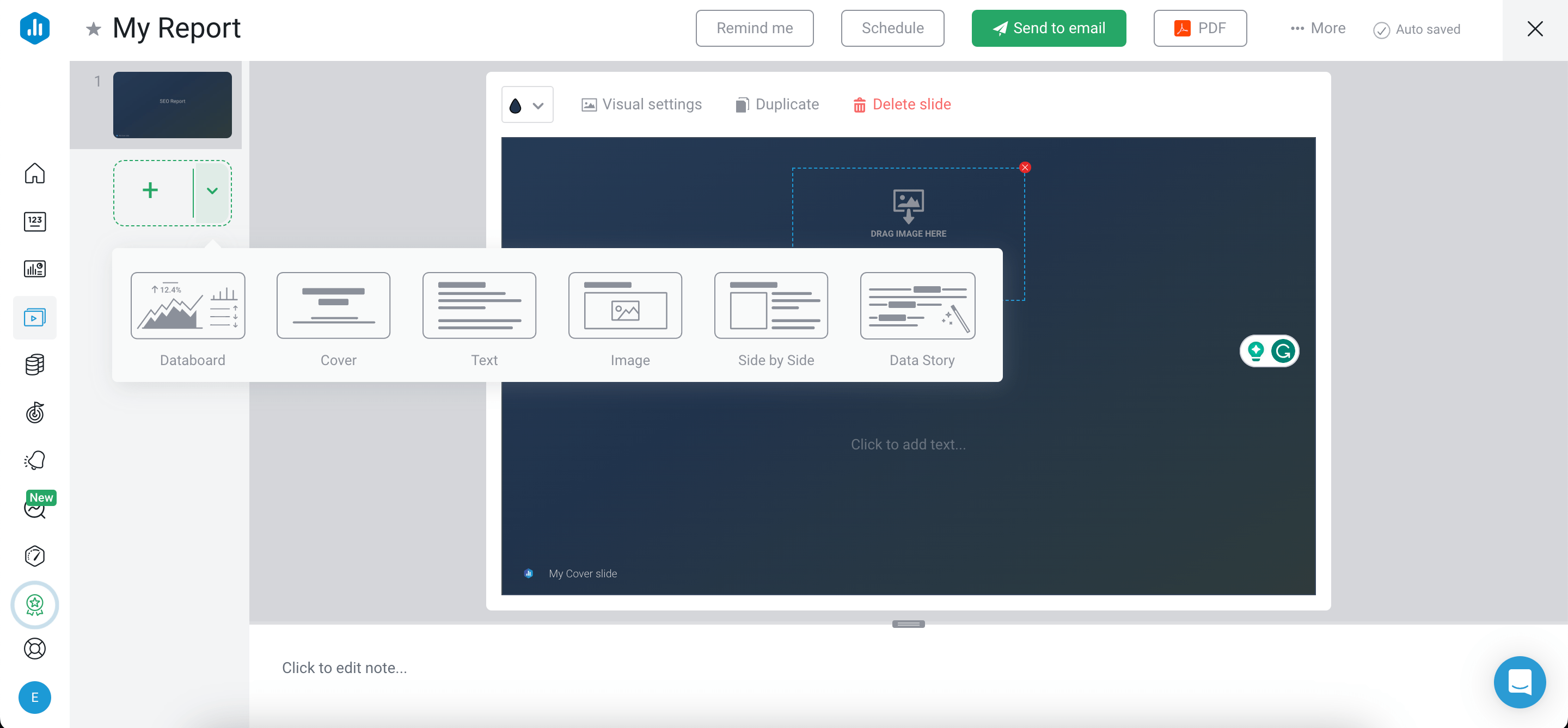
Pros
A Comprehensive array of integrations: Databox offers over 100 one-click integrations, including popular SEO tools like Semrush, Ahrefs, and Google Search Console. It gives users a comprehensive view of their SEO efforts and lets users consolidate metrics from various sources to get a detailed performance overview.
Customizable dashboards: Databox’s Dashboard Designer simplifies the visualization and customization of SEO metrics and KPIs, eliminating the need for coding or design expertise.
Goal tracking: Databox supports real-time visualization and progress tracking toward set goals.
Automated alerts: Users receive prompt notifications about major fluctuations in essential KPIs through their preferred communication channels, such as email, phone, or Slack. They can select specific metrics and define conditions for alerts, ensuring timely updates.
Pre-scheduled reporting: Databox streamlines report generation and delivery, promoting a consistent workflow.
Custom & calculated metrics: The platform facilitates in-depth data analysis without the complexities of coding or spreadsheets. Users can calculate various metrics across multiple sources, including conversion rates and ROI. The integrated Query Builders aid in the creation of custom metrics.
Collaboration and sharing: Designed with collaboration in mind, Databox allows users to share reports during live presentations, in virtual meetings, or through direct email. Automated insights and annotations help present a clear and concise data narrative to all stakeholders.
Cons
Limited customization: Several users have pointed out that Databox’s customization, especially concerning databoard layout, text editing, and data visualization options, could be more robust.
Complexity with custom reporting: Creating custom reports can be challenging. One user mentioned, “It is also somewhat difficult to create custom reporting since an external spreadsheet may be needed to calculate the data.”
Data connection issues: Some users have noted instances where data sources have become disconnected, leading to the potential loss of historical data.
Fixed reporting intervals: Databox doesn’t allow users to choose custom date ranges for their reports. As one user put it, “I am obliged to select a weekly or monthly report; I cannot select a range of dates of my interest to analyze.”
Additional costs for White Label: Users who are looking for branding and white-labeling features must pay an extra $250 per month.
Pricing
Databox offers a tiered pricing structure to cater to businesses of different sizes and needs. They differ in terms of user count, data update frequency, and storable historical data:
- Starter Plan: Priced at $59 monthly, this plan is ideal for startups and small businesses.
- Professional Plan: At $169 monthly, this plan is tailored for mid-sized businesses.
- Growth Plan: With a monthly rate of $399, this plan is suitable for high-growth companies.
- Premium Plan: By paying $999 per month, you get an enterprise SEO reporting software with features and limits suitable for giant corporations.
Each plan includes three data sources, except for the Premium plan, which offers a starting point of 100 data sources. If businesses need more, they can buy an additional data source connection for $6/month.
But Databox’s costs don’t stop there. The platform also offers paid add-ons. For example, the Branding & White-labeling feature comes with an additional fee of $250 per month.
To sweeten the deal, Databox offers a lifetime free plan that includes connecting with three data sources.
Extra features for agencies
- Partner directory: Agencies can list themselves in Databox’s partner directory to expand their reach and find more clients.
- Certifications: Agencies can get specific certifications to build their reputation as a flexible, data-driven partner.
Verdict
Databox is a robust reporting platform with an array of unique and professional-grade tools, from automatic alerts to top-tier report creation utilities. A notable feature is its extensive integration set covering more than 100 tools.
On the downside, Databox’s pricing can pose challenges, especially for those on a tight budget. SEO agencies will feel the pinch most, especially when seeking white-labeling features, which require an additional fee.
But for those with the means, Databox delivers unparalleled performance. Users can use it to create impeccable reports that captivate clients.
10. Reportz
Reportz SEO reporting tool overview
Reportz is a reporting platform for digital marketing professionals, agencies, and freelancers. Its main job is to make the reporting process easier and faster. It does this by providing real-time data access and incorporating various marketing tools. Their offerings include PPC reports, social media reports, ecommerce reports, and SEO reports.
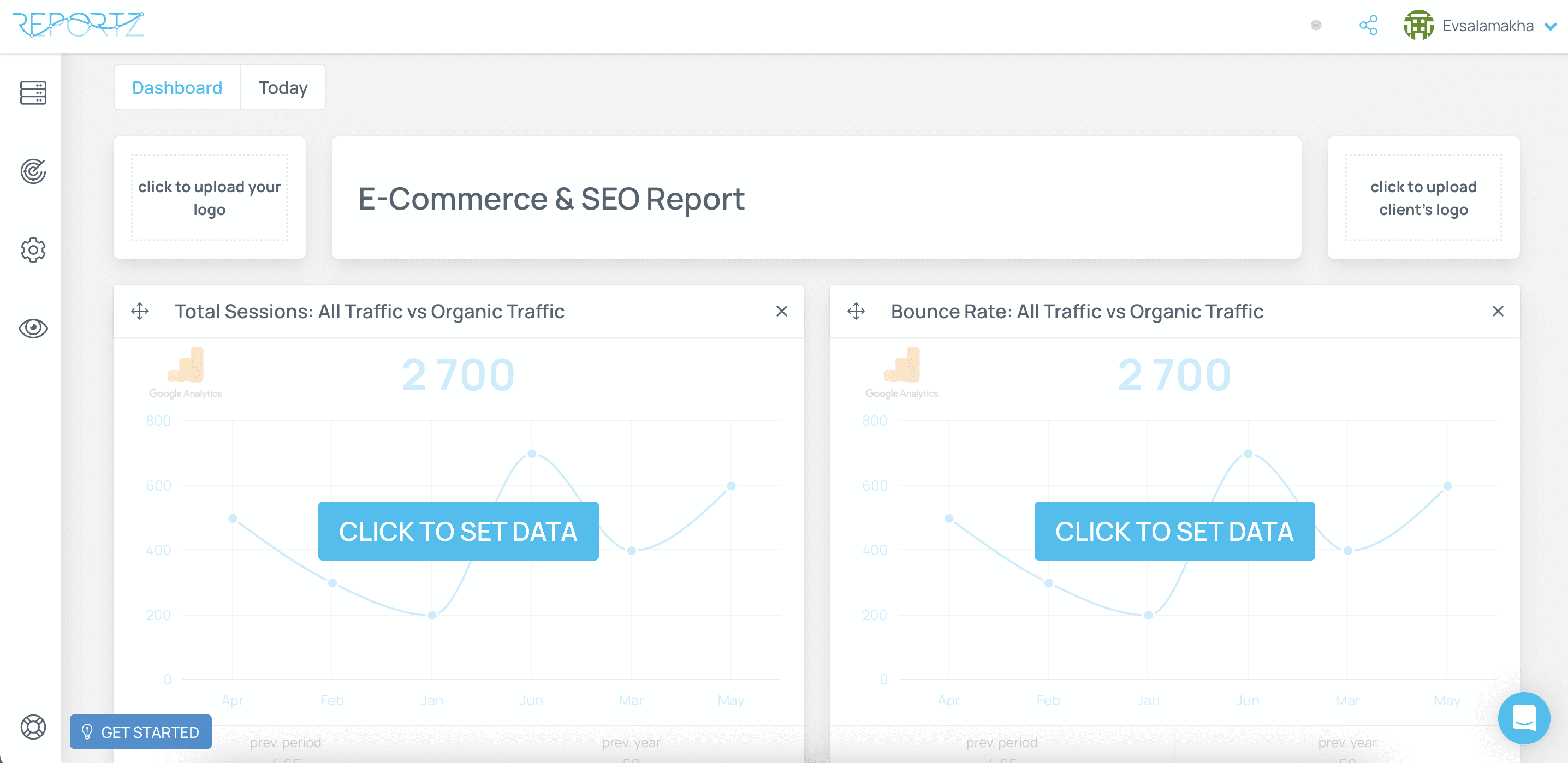
Pros
Dashboard customization: With the freedom to integrate diverse widgets from various sources, users can create dashboards that suit their needs. This makes their reports relevant and comprehensive.
Automated reporting: Agencies can use automated SEO reports to provide regular updates to their clients, eliminating repetitive manual tasks.
White-label reporting: Reportz lets businesses personalize their reports, and this feature is available in all pricing tiers.
Unrestricted access across plans: Every pricing plan offers unfettered access to features, including the number of widgets, integrations, and users.
Enhanced security measures: Prioritize data confidentiality with features like password-protected dashboards and selective URL sharing.
Instantaneous data refresh: The tool updates users’ dashboards in real-time, making continuous oversight and prompt decision-making easier.
Optimized for mobile: With its responsive design, Reportz works well on mobile devices, making it convenient for people on-the-go.
Cons
Limited integrations: Currently, Reportz offers 20 integrations, including GSC, GA4 and popular SEO tools like Semrush, Ahrefs and SE Ranking. The list may be limited for some users, but Reportz promises that more integrations are on their way.
Reduced functionality: When benchmarked against competitors like DataBox, Reportz falls short in terms of features and versatility.
User-friendliness concerns: The ease of use score on G2 for Reportz is 8.1, much lower than the average score of Data Visualization tools, which is 8.7. This suggests a steeper learning curve or even usability issues.
Dated user interface: One user said, “It would be great if they revamped and modernized the UI and the look of the PDF reports.” Reportz might be due for a more contemporary design overhaul.
Pricing
Reportz has a unique pricing strategy compared to other tools. Instead of fixed plans with specific features, it is all about the number of dashboards users need.
The base price is $29.82 per month and includes three dashboards. If you want more, each additional dashboard costs between $9.94 and $8.50. The more dashboards you purchase, the lower the price per dashboard.
Verdict
Reportz is an affordable reporting tool with consistent features, whether you’re purchasing three or 300 dashboards. There are no hidden costs; you pay only for additional dashboards as needed.
For those on a budget and not in need of extensive integrations, Reportz is a worthy solution. However, alternative options might be more suitable for users looking for wider functionality beyond the reporting tool.
11. Looker Studio
Locker Studio SEO reporting tool overview
Looker Studio, previously known as Data Studio, is a free tool from Google designed for bringing data together. This robust platform can handle everything from conventional metrics to nuanced ecommerce sales data.
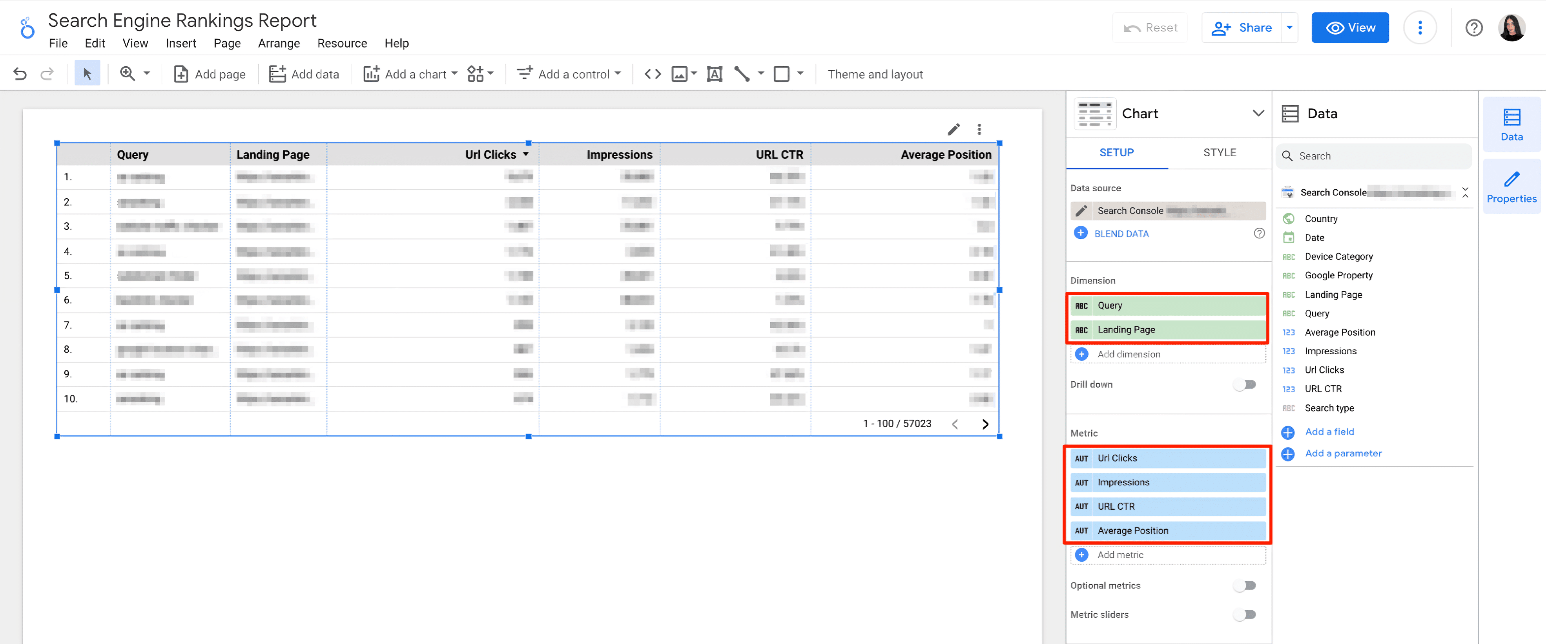
Pros
Extensive integrations: This tool offers almost unlimited integrations, making it a hub for all kinds of data.
Free tool: Looker Studio gives you access to various data visualization and reporting tools at no cost, making it accessible to a lot of people.
Intuitive design: It has user-friendly interface with a drag-and-drop report editor. Even those without technical expertise can use it well.
Robust template library: Users can access a diverse range of report templates for faster and more efficient data visualization.
Advanced API: The Looker Studio API lets users automate the management and migration of Looker Studio assets, making it flexible for different organizational needs.
Embedding capability: Users can embed their Looker Studio reports into any web page, so more people can see them and share them.
Cons
Unclear pricing structure: While there’s a free version of Looker Studio, the price of its premium version, Looker Studio Pro, which has advanced, enterprise-level features, remains undisclosed. Potential users must contact a sales representative to get exact pricing details.
Potential constraints for agencies: Some big organizations might find the free version of Looker Studio isn’t enough for what they need. They might have to upgrade to Looker Studio Pro, but not knowing the cost could be a deterrent for some enterprises.
Varied costs for add-on integrations: Although Looker Studio provides a selection of free integrations, many require separate payment, and the price can change considerably depending on the vendor.
Limited customer support for basic users: While there are online guides and communities, you can’t get much direct help from Google’s support.
Performance issues: Some users say it can be slow, especially for extensive projects.
Pricing
Looker Studio offers a free standard version and a premium one called Looker Studio Pro.
The standard version provides basic reporting and visualization tools. The Pro version is for ، tasks, with team workspaces and Google Cloud project linking. It enhances collaboration, with tiered permissions for different roles. Plus, Looker Studio Pro helps with managing things like organizational reports and data sources, which aren’t tied to individual users.
The price of the paid version is unknown. Users who want pricing details must contact a Google sales representative.
Verdict
Looker Studio is a great place to start, especially for beginners. Its basic package is free, making it a worthy candidate for a test run.
Its capability to integrate with other tools enhances its appeal. So, when you’re looking at marketing tools, especially SEO platforms, check if they integrate with Looker Studio. This can make the data management and visualization process even better.
12. Google Analytics
Google Analytics SEO reporting tool overview
Google Analytics is the top web analytics solution, used by 86% of people. Its core strength is collecting data from websites and apps and turning it into insightful reports. These reports show you important things about your business, including business metrics, user behaviors, and their overall digital journey. Once set up, data starts populating in real time, providing a quick snapshot of user activity and more.
The platform categorizes its reports into two main types:
- Overview Reports: Summaries that provide a ، picture view of metrics like ecommerce sales and mobile ad performances.
- Detailed Reports: These dive into specific areas and provide a more granular view of subjects like individual e-commerce purchase data.
All these reports are neatly organized into collections and easy to find throughout the platform’s interface. This gives all stakeholders a consistent view of data insights.
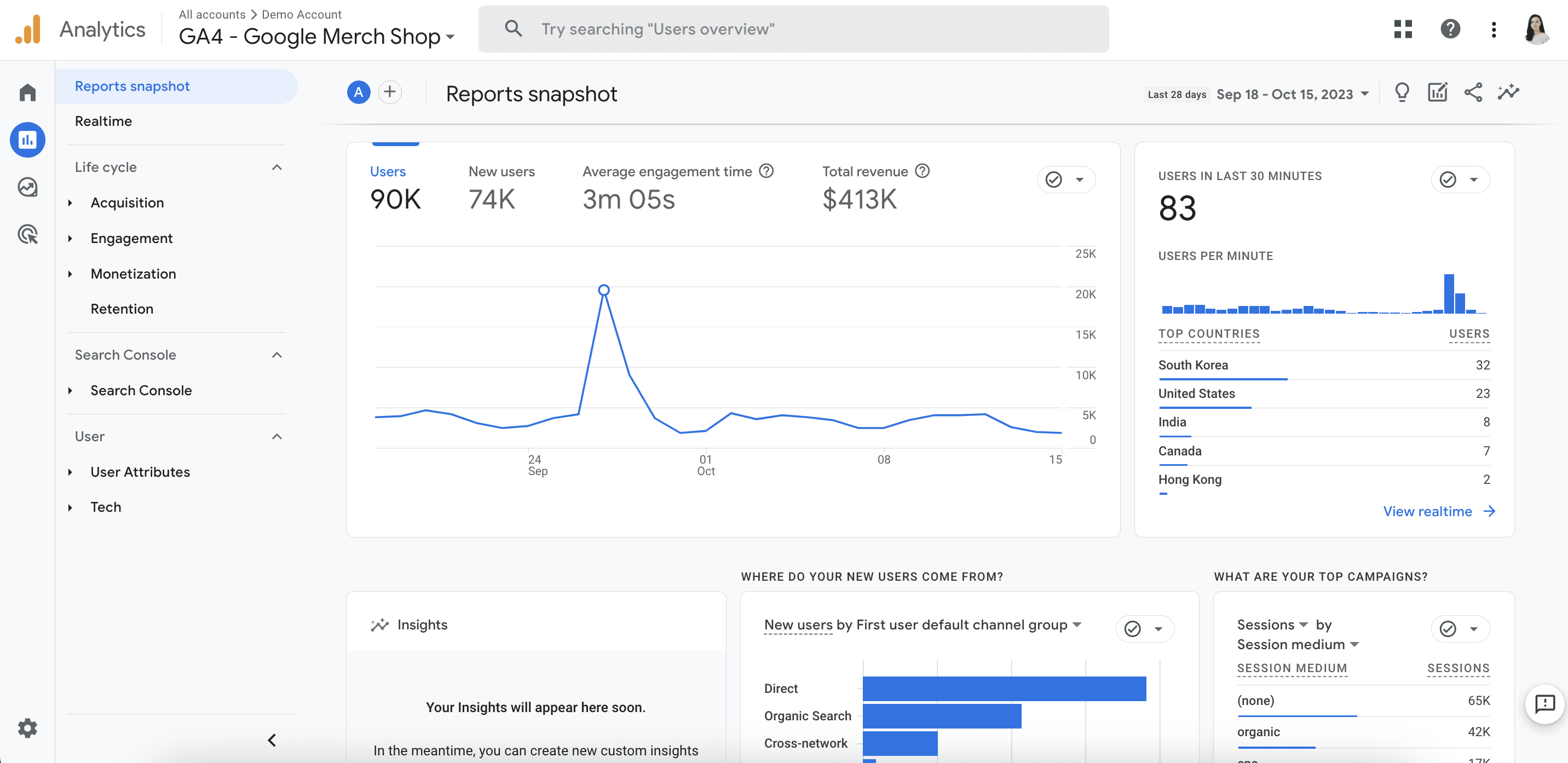
Pros
Comprehensive reporting: This tool provides overarching and detailed views of user activity and business metrics.
Real-time insights: Users gain immediate access to data as it becomes available.
Versatility: The tool captures data from both websites and apps.
User-friendly interface: Even though it does a lot, the tool’s layout is organized for ease of use.
Reliable data collection: It guarantees a consistent and sustainable data flow once set up.
Broad integration capabilities: It works well with nearly every tool on the market.
Free tool: It’s available to everyone, no matter their budget.
Cons
Lack of SEO metrics: Google Analytics is mainly about website metrics like pageviews and user demographics. It doesn’t look deeply into SEO metrics, making it less appealing to SEO experts.
Complexity for beginners: Despite its user-friendly interface, the sheer depth of features and metrics can be overwhelming for new users or small businesses lacking a dedicated analyst.
Potential data accuracy issues: While Google Analytics is robust, it can still have issues like referral spam, which can distort report accuracy.
Limitations in real-time reporting: Despite its real-time function, it can’t handle specific custom event tracking very well.
No white labeling features: This means that agencies cannot rebrand reports with their logos and aesthetics, which could be a drawback when presenting to clients.
Too common: Lots of people use Google Analytics, so agencies might struggle to differentiate their offerings. For this reason, presenting Google Analytics data might not feel exclusive or specialized to clients.
Pricing
Google Analytics has a free version that many people use. There’s also a fancy one called Google Analytics 360. For a recurring subscription fee, this version provides enriched functionalities, such as Unsampled Reports, BigQuery Export, and Data-Driven Attribution.
The pricing for Google Analytics 360 isn’t publicly listed on Google’s site. Instead, users must contact Google’s sales department to get a specific quote.
Extra features for agencies
- Unlimited User Access: There are no restrictions on the number of users, promoting collaborative analysis.
Verdict
Make no mistake about it. Google Analytics isn’t just one of the best SEO reporting tools in this list but a fundamental asset for any website owner. This platform provides foundational data, and offers insights into important metrics like impressions, user count, and more. While it’s super useful it may not completely replace the need for other SEO reporting solutions.
Still, it’s so widely used in the analytics landscape that you should make sure any other tools you choose work well with it. This will ensure a holistic and streamlined data analysis process.
Conclusion
When navigating the expansive landscape of SEO reporting tools in 2023, you’ll encounter many high-quality options. Whether you want a tool that offers more than just SEO reporting or one focused solely on reporting, there’s a tool tailored for every need.
For newcomers looking for a harmonious blend of functionality, user-friendliness, and cost-effectiveness, SE Ranking is a prime pick. It’s not just for reporting; it also offers a robust suite of other SEO tools. If you need advanced reporting capabilities and integrations, Databox is a strong option.
And don’t forget about Google’s free tools, particularly Google Analytics and LookerStudio. They’re essential for every digital marketer. They establish a foundational understanding of website SEO reporting tools and pair well with more niche tools.
In the end, there is no best SEO reporting tool, so to speak. All the tools on our list have distinct advantages and challenges. The one you pick should reflect your unique needs and goals.
منبع: https://seranking.com/blog/best-seo-reporting-tools/